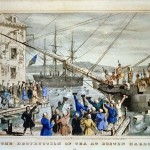 The two Spanish words that summarize the predominant reading and counter-reading of Columbus Day are descubrimiento and conquista.
The two Spanish words that summarize the predominant reading and counter-reading of Columbus Day are descubrimiento and conquista.
Descubrimiento refers to that the word ‘discovery’ points to in English. It emphasizes the subjective experience of Columbus, Spain, and, by extension, Western Europe. Colonialism. When this subjective experience is glorified and placed into a colonial mythology, it becomes Columbus Day as we know it.
Conquista refers to what the English word ‘conquest’ gets at. It emphasizes the political implications of the “discovery” and the subjective experience of the pre-Columbian indigenous people of the Americas. When the implications are closely felt, and this subjective experience is glorified into a post/anti-colonial mythology, it becomes something like Día de la Resistencia Indígena (The Day of Indigenous Resistance).
Both of these words, and their corresponding mythologies, hold bit and pieces of reality. Neither word can fully describe and account for the reality of the historical event in question. When one group or another tries to overemphasize their language to fit a predetermined, ideological worldview — whether it be the equally Western ideas of colonialism or post-colonialism — the event itself suffers.
Serious people should all agree that there is a somewhat well-known reality at stake. It is not made-up by the language describing it. It really happened, as far as we know (notwithstanding the Vikings). It goes something like what follows:
When Columbus landed at place that was outside the geographic horizon of the European imagination, it must have seemed new, like a discovery. However, i the strict, literal sense he was mistaken: this place was actually quite old, filled with life and human folklore and civilizations that, in the aftermath of Columbus’ landing, mostly disappeared. (The population estimates are genocidically staggering.) The reasons those peoples disappeared are complex and multidimensional, but no one can deny that Columbus’ landing had a lot to do with it. The discovery became a conquest. The Americas were more than a novelty item: they became a prize to be won for the glory of an Empire. Imperialism is quite old, but its dark sides cannot be dismissed out of convenience. Today, we can find the imperial and (post)colonial remnants alive and well, with equally mixed and complex details.
If you dig into the historical archives of memories present and lost, if you read the text and the subtext, you will find a fascinating story that cannot be understood when it is spoiled by the politics of language, the favoring of this pet word over that one. Words are tools. And hammers do not build cabinets.
The lesson is simple: the reality of politics are not to be politicized by the politics of language. The implications during this election month are haunting.
More on that later…
On a different topic —race — see my follow-up: Was Columbus White?











